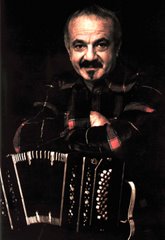 Homenaje a
Homenaje aJulián Plaza
Sexteto Tango
Continuación del Volumen 1
En 1970 inician una prolongada gira por América, visitando Chile, Brasil, Perú, Colombia, Venezuela, Santo Domingo y que termina en Estados Unidos, en la ciudad de Los Angeles.
Cuatro años después son convocados a un importante espectáculo de tango en el Teatro Colón junto a las orquestas de Aníbal Troilo, Horacio Salgán y Florindo Sassone (este último en reemplazo de Osvaldo Pugliese que estaba convaleciente de una operación).
También actuaron los cantores Edmundo Rivero y Roberto Goyeneche.
De aquí en más, resulta imposible relatar la extensa actividad que tuvo el Sexteto, era el conjunto más solicitado y sus discos se sucedían sin solución de continuidad.
Sus nuevas giras por América y Estados Unidos tuvieron un éxito impresionante. También recorrieron Europa en 1987, actuando con gran suceso en Berlin y después en París, en el famoso local "Les trottoirs de Buenos Aires", donde actuaron durante dos meses como único número.
Después a Japón, donde ya los conocían por su paso con Pugliese y repitieron con tanto suceso, que volvieron en dos oportunidades más.
El Sexteto Tango grabó once long plays, todos para el sello RCA-Victor y uno en Japón para CBS Columbia.
Entre sus registros más interesantes quiero destacar "Trasnoche", un bellísimo tango instrumental de Julián Plaza que tiene una melodía nostálgica y melancólica y un arreglo espectacular de su autor.
Además de Jorge Maciel el Sexteto contó con las voces de Raúl Funes y Jorge Mariano.
En 1983 hicieron un disco completo con 12 temas cantados por Roberto Goyeneche, en los que se destacan el bonito vals "Esquinas porteñas" de Sebastián Piana y Homero Manzi y el tango "Estrella" de Marcelino "Cholo" Hernández y Roberto Cassinelli.
El Sexteto Tango tenía cuatro arregladores: Osvaldo Ruggiero, Julián Plaza, Victor Lavallén y Emilio Balcarce, todos además, grandes compositores.
Cada vez que los vuelvo a escuchar, me confirman que el tango para evolucionar no necesita apartarse de sus raíces y desnaturalizar su ritmo y menos, someter su melodía a arreglos que en muchos casos la hacen irreconocible. El Sexteto Tango constituye un ejemplo de tango legítimo y moderno cuyo recuerdo, a modo de homenaje, quise resaltar en esta breve semblanza.
Translation
From Volumen 1
In 1970 they started a long tour of the American continent that included Chile, Brazil, Peru, Colombia, Venezuela, Santo Domingo and ended in the United States, in the city of Los Angeles.
Four years later they were invited to an important tango show at the Teatro Colón alongside the orchestras led by Aníbal Troilo, Horacio Salgán and Florindo Sassone (the latter substituting for Osvaldo Pugliese who was recovering from a surgical operation).
The singers Edmundo Rivero and Roberto Goyeneche as well performed then.
From now on it turns out impossible to describe the crowded agenda of the Sexteto. It was the most requested outfit and its records were released without interruption. Their new tours of Latin America and the United States received an impressive acclaim. They also toured Europe in 1987, appeared successfully in Berlin and later in Paris at the famous local "Les trottoirs de Buenos Aires" where they were spotlighted for two months as the only show.
Later they went to Japan where they were already known as Pugliese's musicians. Their shows were so successful that they returned to that country twice.
The Sexteto Tango recorded eleven LPs, all for RCA-Victor and one in Japan for CBS Columbia.
Among their most interesting recordings I want to highlight "Trasnoche", a quite beautiful instrumental tango by Julián Plaza that has a nostalgic, melancholic melody and a nice arrangement written by its composer.
Besides Jorge Maciel, the Sexteto had Raúl Funes and Jorge Mariano on vocals. In 1983 they released a record with 12 numbers sung by Roberto Goyeneche, among which we highlight the beautiful waltz "Esquinas porteñas" written by Sebastián Piana and Homero Manzi and the tango piece "Estrella" by Marcelino "Cholo" Hernández and Roberto Cassinelli.
The Sexteto Tango had four arrangers: Osvaldo Ruggiero, Julián Plaza, Victor Lavallén and Emilio Balcarce, furthermore they are all great composers.
Every time I listen to them, they confirm to me that tango, in order to evolve, does not need to depart from its roots and denaturalize its rhythm and, especially, its melody that should not be distorted with arrangements that, in many cases, make it hardly recognizable. The Sexteto Tango is an example of legitimate modern tango whose memory, as a homage, I highlight in this brief portrayal.
Link:
http://rapidshare.com/files/26881146/RBerdi_SextTango-SelTemas-V2.rar
.







No hay comentarios.:
Publicar un comentario